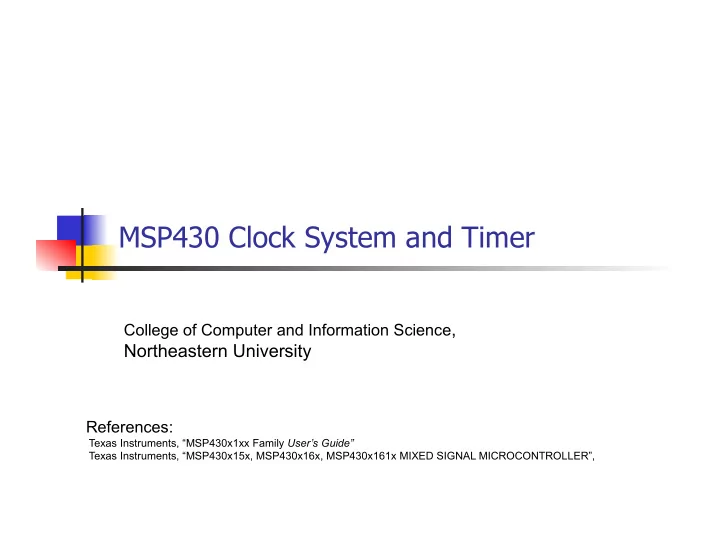

MSP430 Clock System and Timer College of Computer and Information Science , Northeastern University References: Texas Instruments, “MSP430x1xx Family User’s Guide” Texas Instruments, “MSP430x15x, MSP430x16x, MSP430x161x MIXED SIGNAL MICROCONTROLLER”,
Outline MSP430 basic clock module MSP430 Timer A Timer A examples
MSP430 Basic Clock Module Clock Sources: LFXT1CLK : Low-frequency/high-frequency oscillator XT2CLK : Optional high-frequency oscillator DCOCLK : Internal digitally controlled oscillator (DCO) Tmote Sky Configuration: LFXT1CLK : 32.768KHz crystal XT2CLK : N/A DCOCLK : Built-in DCO with configurable range from <100KHz to 4MHz
MSP430 Basic Clock Module Clock Signals: ACLK : Auxiliary clock. The signal is sourced from LFXT1CLK with a divider of 1, 2, 4, or 8. (The calibration program for the serial link sets the divider to 4, but after the calibration it can be changed to any other values.) ACLK can be used as the clock signal for Timer A and Timer B. MCLK : Master clock. The signal can be sourced from LFXT1CLK, XT2CLK (if available), or DCOCLK with a divider of 1, 2, 4, or 8. MCLK is used by the CPU and system. SMCLK : Sub-main clock. The signal is sourced from either XT2CLK (if available), or DCOCLK with a divider of 1, 2, 4, or 8. SMCLK can be used as the clock signal for Timer A and Timer B.
Clock System Registers
MSP430 Timer_A A 16-bit counter 4 modes of operation – Stop, Up, Continuous, Up/Down 3 capture/compare registers (CCRx) 2 interrupt vectors – TACCR0 and TAIV
Modes of Operation: Up Mode
Modes of Operation: Continuous Mode
Modes of Operation: Up/Down Mode
Timer_A Interrupt Vectors TACCR0 interrupt vector for CCIFG of CCR0 TAIV interrupt vector for TAIFG and CCIFGs of CCR1,CCR2
Timer_A Registers TACTL, Timer_A Control Register (PART 1)
TACTL, Timer_A Control Register (PART 2)
TACCTLx, Capture/Compare Control Register
TAIV, Timer_A Interrupt Vector Register
Example 1 Continuous Mode Output pin P5.4 (Red LED) with toggle rate = 32768/(32768) = 1 Hz #include "include/include.h" #include "include/hardware.h" int main ( void ) { WDTCTL = WDTPW + WDTHOLD; // Stop WDT P5DIR |= 0x10; // P5.4 output CCTL0 = CCIE; // CCR0 interrupt enabled CCR0 = 32768; TACTL = TASSEL_1 + MC_2; // ACLK, continuous mode eint(); // Enable the global interrupt OR LPM0; // Enter low power mode } _BIS_SR(LPM0_bits + GIE); // Timer_A TACCR0 interrupt vector handler interrupt (TIMERA0_VECTOR) TimerA_procedure( void ){ P5OUT ^= 0x10; // Toggle P5.4 CCR0 += 32768; // Add offset to CCR0 }
Example 2 Up Mode Output pin P5.4 (Red LED) with toggle rate = 32768/(32768) = 1 Hz #include "include/include.h" #include "include/hardware.h" int main ( void ) { WDTCTL = WDTPW + WDTHOLD; // Stop WDT P5DIR |= 0x10; // P5.4 output CCTL0 = CCIE; // CCR0 interrupt enabled CCR0 = 32767; TACTL = TASSEL_1 + MC_1; // ACLK, upmode _BIS_SR(LPM0_bits + GIE); // Enable the global interrupt and enter LPM0 } // Timer_A TACCR0 interrupt vector handler interrupt (TIMERA0_VECTOR) TimerA_procedure ( void ){ P5OUT ^= 0x10; // Toggle P5.4 }
Example 3 Continuous Mode Output pin P5.4 with toggle rate = 32768/(16384) = 0.5 Hz Output pin P5.5 with toggle rate = 32768/(32768) = 1 Hz Output pin P5.6 with toggle rate = 32768/(65536) = 0.5 Hz #include "include/include.h" #include "include/hardware.h" int main ( void ) { WDTCTL = WDTPW + WDTHOLD; // Stop WDT P5DIR |= 0x70; // P5.4, P5.5, P5.6 in output mode CCTL0 = CCIE; // CCR0 interrupt enabled CCTL1 = CCIE; // CCR1 interrupt enabled CCTL2 = CCIE; // CCR2 interrupt enabled CCR0 = 0; CCR1 = 0; CCR2 = 0; TACTL = TASSEL_1 + MC_2+ TAIE; // ACLK, contmode, TAIE enabled _BIS_SR(LPM0_bits + GIE); // Enable the global interrupt and enter LPM0 }
Example 3, continued // Timer_A TACCR0 interrupt vector handler interrupt (TIMERA0_VECTOR) TimerA0_procedure ( void ){ P5OUT ^= 0x10; //on TACCR0 Toggle P5.4 (Red LED) CCR0 += 16384; // Add offset to CCR0 } // Timer_A TAIV interrupt vector handler interrupt (TIMERA1_VECTOR) TimerA1_procedure ( void ){ switch( TAIV ) { case 2: P5OUT ^= 0x20; // on TACCR1 CCIFG Toggle P5.5 (Green LED) CCR1 += 32768; // Add offset to CCR1 break; case 10: P5OUT ^= 0x40; // on Timer overflow TAIFG Toggle P5.6 (Blue LED) break; } }
Recommend
More recommend